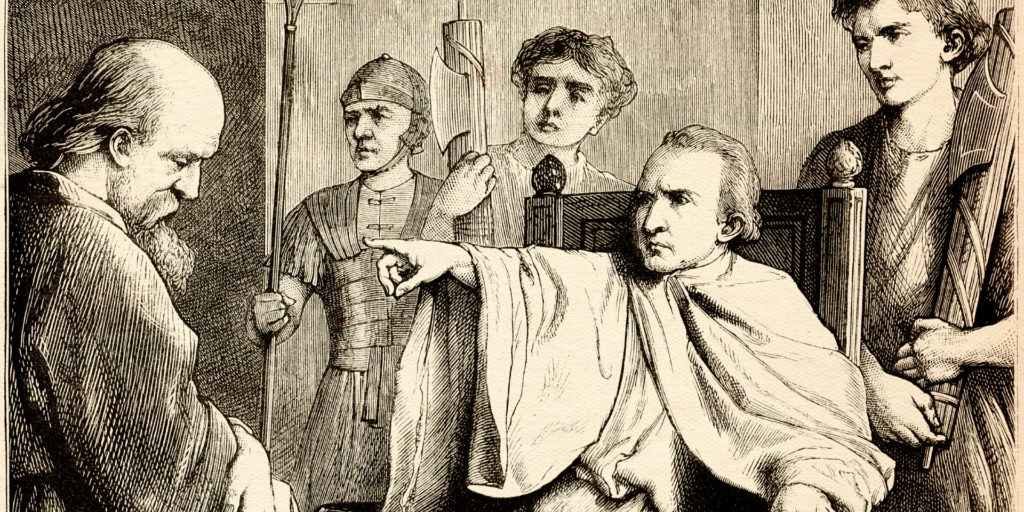
Apostolic Fathers Every Christian Should Know: Polycarp of Smyrna
Last week we began a series on the Apostolic Fathers written by Kenneth Berding. The Apostolic Fathers are the authors of the earliest Christian writings after the period of the Apostles. The writings span the end of the first century until the middle of the second. Kenneth Berding (Ph.D., Westminster Theological Seminary) is professor of New Testament at Biola University and the director of Bible Fluency: Sing It, See It, Study It.
Here are seven things you should know about Polycarp of Smyrna:
1. Polycarp was probably the most important Christian leader of the first half of the second century. Since he lived to be such an old man (at least 86 years old), he linked the age of the apostles all the way to the middle of the second century.
2. The only writing of Polycarp in circulation (apart from a few of his sayings quoted by Irenaeus) is a letter he wrote to the church in Philippi during the second or third decade of the second century. More than any other letter in the collection of writings we call the Apostolic Fathers, Polycarp’s Letter to the Philippians almost has the feel of a New Testament letter—full of godly advice for how to live a righteous life.
3. Polycarp knew his Bible really, really well. Have you ever met an older person who has spent so much time in the Bible that when they talk they sound like the Bible, and constantly reference the Bible? That’s what Polycarp was like. A reader of his letter encounters allusion after allusion to earlier—especially biblical—writings. His letter is saturated in such quotations and allusions.
4. Polycarp spent a bit of time with Ignatius in Smyrna—Polycarp’s city—when Ignatius passed through Smyrna on his forced march toward Rome to face martyrdom. Shortly after that visit, Ignatius wrote Polycarp a personal letter, which now is part of the collection of writings of Apostolic Fathers (The Letter of Ignatius to Polycarp). Later, Polycarp collected all the Letters of Ignatius for the church in Philippi. Because of his age and stature, Polycarp would have been capable of answering many questions modern scholars ask about the apostolic age. Click To Tweet
5. Because of his age and stature, Polycarp would have been capable of answering many questions modern scholars ask about the apostolic age. It turns out that he did in fact inadvertently answer one question that many modern scholars have been skeptical about, that is, the question of whether Paul wrote the Pastoral Epistles. Many contemporary scholars claim that Paul didn’t write those letters; but in light of the way Polycarp quotes from 1 & 2 Timothy in the midst of clusters of Pauline allusions, Polycarp must have assumed that the Pastoral Letters were written by Paul himself.[1]
6. In his old age, Polycarp traveled to Rome to defend the position of the churches in Asia Minor on the date when Easter should be celebrated each year (the Quartedeciman controversy).
7. Polycarp was martyred in his own city of Smyrna in the middle of the second century. The account of his martyrdom (The Martyrdom of Polycarp, another of the documents in the collection now known as the Apostolic Fathers) was written for the church in Philomelium. Later Christians were able to look back at Polycarp’s martyrdom and use it as an example of how to face suffering and martyrdom.
For more information about the Apostolic Fathers, see Kenneth Berding’s easy-to-read narrative introduction (story form), The Apostolic Fathers: A Narrative Introduction.
Endnotes
[1] For full argument, see chapter 4 of Kenneth Berding, Polycarp and Paul: An Analysis of Their Literary and Theological Relationship in light of Polycarp’s Use of Biblical and Extra-Biblical Literature (Leiden: Brill, 2002), 142-155 and an article on the same subject: Kenneth Berding, “Polycarp of Smyrna’s View of the Authorship of 1 and 2 Timothy,” Vigiliae Christianae 53 (1999): 349-360. Apologists and authors of introductions to the New Testament would do well to add this argument to other older arguments defending the Pauline authorship of the Pastorals.

